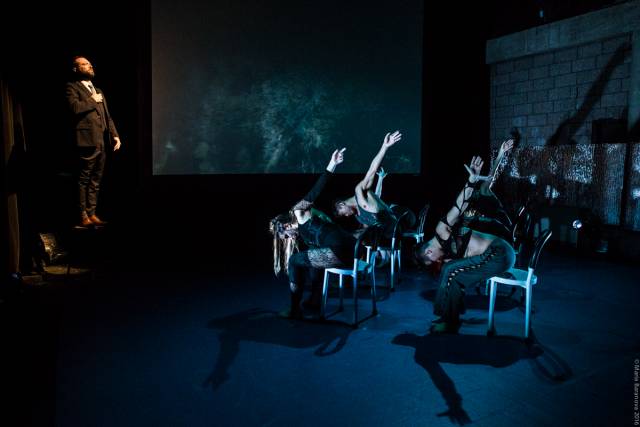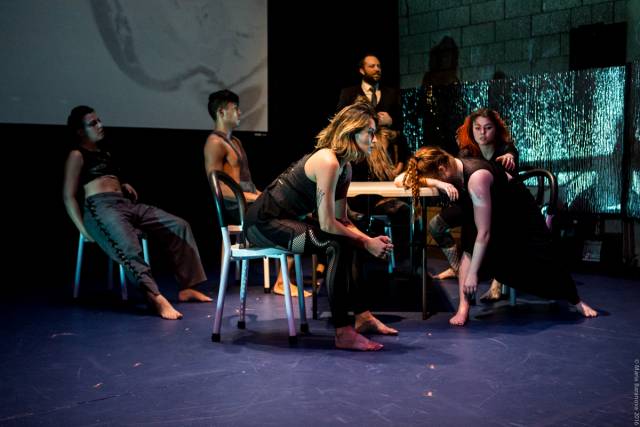

Imagine if Neil deGrasse Tyson hosted a gameshow in which reexamining the purpose of your life was the prize, and you’re only starting to get a sense of what The Loon feels like. Part lecture on time, part study of domestic life, part contemporary dance performance, part solo play, and part interpretation of Voices of the Loon, this piece by Witness Relocation and Robert M. Johanson delivers existential dilemmas and laughs in equal measures. I spoke to Johanson about the ideas behind the show, how it relates to his work as a professor, and what’s up with the bird of the title.
I was afraid the nature of the show set me up to have a really strange interview, because you could refute everything I say! You could ask me, “is this an interview?”, “what is really an interview?”, so it made me curious about what reactions people have after they see the show.
It’s been back and forth, some people talk to me afterwards and say “I was there with you all the time, following all the twists”. I talked to a philosophy major recently and that night my in-ear was really loud, and it was a problem for me, but he thought the loud in-ear was part of the show, because it was changing the reality that came through my ear. Because it’s so referential, so many things could be a part of it. Mistakes work well due to the nature of the piece. People don’t come out having an opinion right away, they think longer about it.
It was a bit too much existentialism for a Saturday night for me…
(Laughs)
….but this you’re mentioning about the person who thought the mistakes were part of the show makes me think about how we believe everything should be customized for us nowadays. In the show there’s a moment where you simply open your mouth and tell us we should imagine what you’re saying. Can you talk about whether this was something in your mind when you wrote the piece with Dan Safer?
I wouldn’t say it was necessarily what I thought of, although it’s an interesting point. I talk so much in the piece, and go through so many topics by the time we get to the section on reality that I thought if I would give people control, I might as well give them control of the content. It’s totally up to the audience to do that, some people do, some don’t. It’s up to you at that point. What live theatre has that movies and TV don’t have is that it allows us to communicate with each other. Even with Nature Theater that was a concern of us, we were exploring this relationship between audience and performer.
I was in awe at your ability to memorize all those lines and then you tell us that you’re wearing an earpiece, which made me think of that scene in Nature Theater’s Life and Times: Part 8 where you sing a song on the subway. Alas, Kelly and Pavol dispelled my amazement that time as well and mentioned an earpiece.
I’m actually terrible at learning lines, that’s not the reason for using the earpiece though.
That gives the show a different layer. Was there a defining moment when you realized that breaking the artifice was part of why you wanted to do this?
The piece was getting to a point where we have people dancing, the honesty section before the reality section, everyone is on the same page. There’s an equalizing between the performance and audience, and in order to achieve this the rules of the game needed to be laid out, which is why I speak about the earpiece. I wanted to be completely honest about the artifice, we could speak through the artifice.
If you’re working on a solo piece, do you try to do something completely different from what you’d do with Nature Theater? Or do you want your work to be easily identifiable?
I try to work on whatever I’m working on, the stuff that I’m interested in is something I explore with Nature Theater as well. I don’t think about it too much, I focus on whatever is needed for each project. In this piece I deal with more personal things like identity, so if people come knowing me as the person from Nature Theater that’s fine.

The frame of the show is kinda like Cosmos meets The Price is Right meets The Dick Van Dyke Show. Where there any specific figures that influenced this work?
Dan and I wanted to discuss two things in the show and they kinda bookend, there’s the stuff about time, and the Voices of the Loon record. Working on the piece we did the Loon part first, then I went to Europe to work on some pieces, when I returned we worked on the time section and it moved into a more personal zone. The structure then starts with something more personal and then goes into something more performative. The distance gets greater and greater.
You’re asking your audience to be an “active audience”, which is great because we’re so used to sitting and being entertained. Can you describe what an ideal audience is like to you?
You said it, I believe in a very active audience. I believe there’s ways to get to that point with them, either you give them a lot at the beginning, or you can slowly teach them the rules of the game. It’s hard, you almost have to use little tricks to achieve this. It’s not necessarily about making the audience like you because then they relax too much and just enjoy the show, but it’s not about making them combative either, it needs to be a more complex relation between both sides. They need to know they can bring in as much as I can, it’s cyclical performing you take something from them and bring it out.
You teach theatre, in the show you address things that live performances could improve upon. Are there any parallels between The Loon and the way you approach teaching theatre?
Yeah very much so, I wrote an academic paper in Norway last year - I teach mostly in Europe - so I would say this equalizing effect was what that paper was about. The way in which theatre can become more inclusive in the performance, how does it become a dialogue. The show can be didactic at times, and that’s fine, as it evolves there’s the idea of a lecture going on.
I kept subtitling it An Inconvenient Truth…
(Laughs)
When I saw the show I was hoping there’d be a “loon” reference from On Golden Pond, which never happens. What have you found are elements people assume will be in the show, which aren’t there?
People expect you to talk about loneliness or some sort of story from Maine or Minnesota, a Garrison Keillor kind of thing maybe, in the end the loon is more of a metaphor. It’s always a fun moment when I tell people “you’re waiting for me to talk about loons”, and they’re interesting, but they weren’t necessarily the most interesting for me in the show. It’s just the name of the show.
For tickets and more information on The Loon click here.